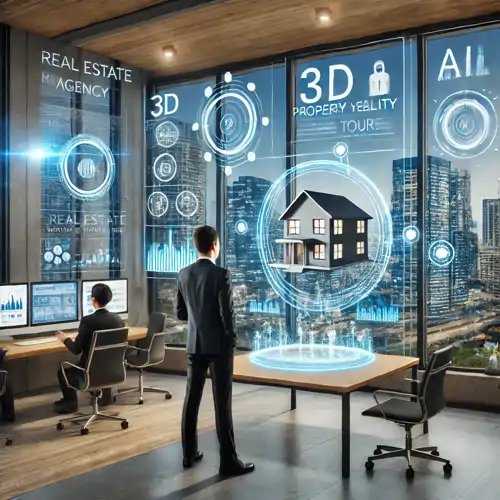How Modern Technologies Solve the Problems of Property Search and Selection
The modern real estate market faces a number of problems that negatively impact business efficiency. Traditional methods of property appraisal, manual data processing, expert subjectivity, and lengthy decision-making processes lead to delays, errors, and increased costs. Innovative technologies capable of optimizing processes, reducing risks, and ensuring transaction transparency are needed to address these issues.
Problems with Traditional Methods
The main pain points for real estate professionals are:
- Inefficiency in property appraisal. Traditional methods require significant time and human resources. The property appraisal often relies on the experience of realtors, leading to subjectivity and errors in determining value.
- Limited analytical capabilities. The analysis of large data sets is performed manually or with outdated tools, which complicates forecasting market trends and identifying optimal investment opportunities.
- Low level of process automation. Property management, customer interaction, and transaction processing are carried out through fragmented systems, increasing the likelihood of delays and errors.
- Limited customer support. Traditional call centers operate on fixed schedules, and the absence of 24/7 service reduces customer satisfaction.
The Role of Artificial Intelligence (AI – artificial intelligence) in Real Estate
The implementation of AI (artificial intelligence) is significantly changing the approaches to solving the aforementioned problems. Modern AI models are capable of:
- Processing and analyzing large amounts of data. AI-based systems analyze historical data, macroeconomic indicators, regional characteristics, and other factors, which enables the creation of objective and accurate property valuations. For example, automated valuation models (AVM) can process dozens of hours of analytical work in just minutes, reducing time costs and increasing accuracy.
- Forecasting market trends. AI uses predictive algorithms to analyze the dynamics of supply and demand, which helps investors make informed decisions and minimize risks. According to analytical forecasts, the market for AI solutions in Real Estate was valued at $164.9 billion in 2023 and is expected to grow to $226.7 billion in 2024, with an approximate annual growth rate of 34%.
- Automating property management. AI systems can monitor the technical condition of properties, detect malfunctions, and promptly take measures to resolve them, reducing maintenance costs and enhancing service quality.
- Providing round-the-clock customer support. Chatbots and virtual assistants powered by AI respond to customer inquiries at any time, offering personalized recommendations and improving interaction with potential buyers.
Virtual and Augmented Reality (AR/VR – augmented and virtual reality)
AR/VR technologies (augmented and virtual reality) significantly improve the process of presenting properties. They allow for:
- Conducting virtual tours. Potential buyers and renters can explore a property remotely, which saves time and reduces costs. For example, virtual tours provide a complete view of the property without the need for a physical visit.
- Visualizing renovations and design. AR/VR technologies enable clients to envision how a property might look after renovation or decoration, helping them make informed choices.
Blockchain and Smart Contracts
The adoption of blockchain technology in the real estate sector ensures a high level of transaction transparency and reduces the risk of fraud. The main advantages include:
- Decentralization and immutability of records. All operations are recorded in a secure digital ledger, making it easy to verify property history and confirm the legitimacy of transactions.
- Utilization of smart contracts. Smart contracts automatically execute transaction terms without intermediaries, which reduces transaction time and costs.
- Tokenization of real estate. This technology allows a property to be divided into shares, making investments accessible to a broader range of investors.
Application of the Internet of Things (IoT – Internet of Things) and Smart Homes
IoT (Internet of Things) technology, combined with the concept of smart homes, opens up new possibilities in property management. IoT-based systems allow for:
- Automating the management of properties. Sensors and intelligent systems monitor infrastructure condition, energy efficiency, and building security.
- Optimizing energy consumption. Automation systems, such as smart thermostats and lighting systems, help reduce utility costs and ensure comfortable living conditions.
- Providing remote monitoring. Property owners can monitor the status of their properties in real time, quickly responding to malfunctions or emergencies.
Additional Technological Solutions
Besides AI, AR/VR, blockchain, and IoT, the real estate market actively employs other innovative technologies:
- Big Data. Analyzing vast amounts of information helps identify trends, determine the most promising properties, and conduct highly accurate marketing campaigns.
- 3D Printing. This technology is used for constructing affordable housing and creating prototypes, thereby reducing construction time and costs.
- Cloud Computing. Cloud technologies provide centralized access to data and improve collaboration among various company departments, enhancing the efficiency of decision-making processes.
Conclusions and Recommendations
The analysis of modern technologies shows that their integration into the real estate sector can solve the key problems of traditional methods. Artificial intelligence (AI – artificial intelligence) and related technologies significantly accelerate data processing, ensure objective property appraisal, and automate many property management processes. Virtual and augmented reality technologies (AR/VR – augmented and virtual reality) allow clients to get a comprehensive view of a property without a physical visit, while blockchain ensures transaction transparency and security. The Internet of Things (IoT – Internet of Things) and smart systems create optimal conditions for property management, reducing operational costs.
For real estate professionals, transitioning to digital technologies and integrating innovative solutions into business processes becomes essential. This not only reduces the time and cost of routine operations but also significantly enhances a company's competitiveness. The projected growth of the technology market in real estate confirms the relevance and necessity of their implementation. In an environment of high competition and constant change, investing in modern technologies becomes a crucial condition for business success.
The comprehensive application of these technologies allows for risk minimization, increased efficiency in customer service, and the creation of a transparent, objective transaction management system. For companies striving not only to survive but also to thrive in today's conditions, it is vital to view innovative solutions as a strategic tool capable of ensuring sustainable growth and a competitive advantage in the real estate market.








